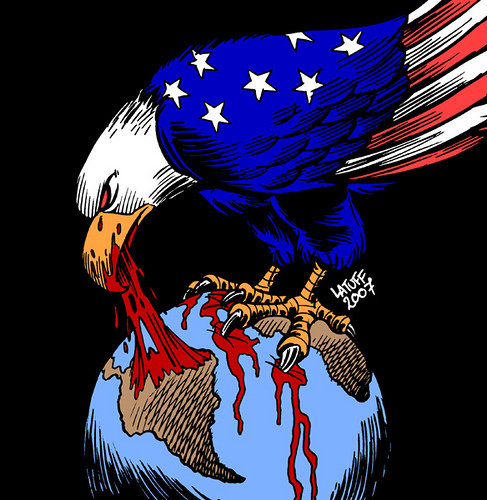Edited by Harley Jackson

For many, Yankee imperialism forms part of the reality that greatly characterizes our daily lives and essence as a continent.
This fact has led some to accept Yankee imperialism as the sole explanation to all the awful suffering in our Latin American and Caribbean villages. Instead of attempting to understand the historical elements that have made this suffering possible, these people are satisfied with a simplistic view that does not explain the causes of the underdevelopment to which we seem condemned without chance of redemption.
Gringo imperialism has been evident since the end of the 19th century, and has resulted in an endless aftermath of military interventions (direct and indirect), coups, economic sanctions, abductions, assassinations and disappearances of leaders and popular fighters.
All of these actions conform to a vast range of tactics and strategies directed to assure Washington’s, and its grand transnational corporations’, hegemony and control over the Latino-Caribbean markets, diverse natural resources and subordinate national sovereignties; which they allow only to a certain extent. In other words, in order to not affect their power within our countries, they will allow only some traces of nationalism and independence.
The strategy of greatest consequence put in place by the dominant United States, though, is their cultural influence, which is in a war to the death against the villagers’ resistance. This is a war on a global scale, earning them the monopoly over all means of information and reducing everything to their one vision of the world. This war is forcing the adoption of the so-called “American way of life,” in a process of cultural Darwinism that disregards, with the arrogance characteristic of the Yankee, the existing cultural diversity in Latin America and the Caribbean.
In this way, our “underdeveloped” societies maintain a foothold between the “modern” (i.e. gringo) and the aboriginal culture. As a result of this situation, the victims of this constant alienation end up ashamed of everything that relates to Latin American and Caribbean culture, and, thus, turn to other cultures. These people imitate individuals in the Anglo-Saxon North, even if the North Americans see them as very ignorant for emulating U.S. style.
According to its neoliberal concept of economic globalization, Yankee imperialism sees all expressions of independence and cultural identity in villages as constituting a grave threat to the success of its plans to control territory, basic resources and global markets. The Yankees are engaged in a low intensity war that is backed by most of the broadcast media. National businessmen, with extensive American capital, control this media and therefore, shape the values that form people’s national character.
The leaders of Washington are very conscious of this and recognize that the cultural movements of our villages are clear manifestations of resistance against their domineering actions. These cultural movements promote more than just awareness; they also promote profound revolutionary feelings. Contributing to a better understanding of reality, these new cultural tendencies have caused Latin America and the Caribbean to realize that it is necessary to prevent the stronger force from winning this war of cultural resistance.

Leave a Reply
You must be logged in to post a comment.